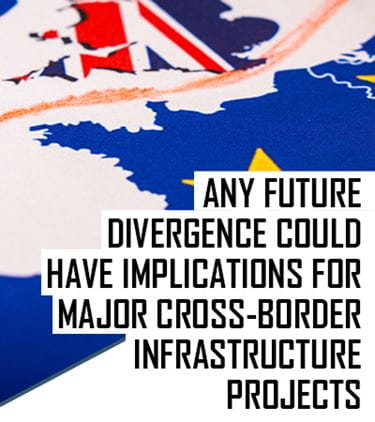In the four decades since the United Kingdom joined the European Union, the direction and scope of environmental policy has been fundamentally changed and, in many ways, been driven by the requirements of our membership. For some, this has resulted in a welcome uplift in standards; to others the period has been characterised by unnecessary and expensive bureaucracy.
Main body: With a basis in documents such as the Environmental Impacts Assessment (EIA) Directive and the Habitats Directive, the existing EU environmental policy context is clear, and it is generally concluded that the resulting legislation has delivered environmental improvements.
A large number of major infrastructure projects over the last 20 or so years, particularly for water and wastewater, have resulted directly from the standards set out in EU directives on the environment. It’s now clear that major change is ahead. To what extent will our disassociation from EU directives impact not only the quality of our environment, but also the size and priority of the market required to deliver any new policy?
Five key environmental post-Brexit considerations
1. International environmental conventions
The UK has signed up to a number of wide-ranging international conventions on environmental matters, including the Bern and Ramsar Conventions (wildlife conservation), the Basel Convention (international waste shipments), and the Aarhus Convention (access to justice and information on environmental matters).
The UK Government has expressed a desire, notwithstanding any EU agreements, to remain partyto these international conventions, so the extent of possible changes once we leave the EU to some key environmental legislation would be limited.
2. The EU (Withdrawal Agreement) Bill
Over time, EU legislation has become embedded within UK law – Britain’s standards on water, air, waste and wildlife, for example, are enforceable by the EU. The European Union (Withdrawal) Act 2018 would transpose existing directly applicable EU law into UK law.
Although the Government has previously promised that environmental protection standards won’t fall, such commitments feature in the non-binding Political Declaration; not in the Withdrawal Agreement Bill.
But, for major and national infrastructure projects, it is likely that well-understood parts of the consenting process, for example the EIA Regulations in their various forms, will remain unchanged – at least for the time being.
3. Divergence between UK and EU in future

There is, therefore, the potential for future divergence in approaches to environmental protection between the EU and the UK, as new EU Directives are implemented.
Any future divergence could have implications for major cross-border infrastructure projects between the EU and the UK, such as interconnectors.
4. Divergence within the UK after we leave the European Union
In the UK, planning and many aspects of environmental policy are devolved, allowing EU legislation to be interpreted differently in Northern Ireland, Wales and Scotland.
Post-Brexit, devolved nations may attach different priorities; the Welsh Assembly and the Scottish Government have already pursued environmental policies that are more ambitious than Westminster (for example, under the Waste Framework Directive, Wales has set higher targets than in England).
Without the overarching EU Directives, things may diverge further, with the devolved administrations setting their own objectives, targets and regulations. The devolution settlements included a commitment that no decision making that has been devolved will revert, so future governments are unlikely to be able to ensure a more consistent approach.
In the long term, infrastructure projects which span UK internal borders may need to give greater consideration to regulatory differences.
5. Environment Bill
The Environment Bill, introduced to the UK Parliament on October 15th 2019, is not directly related to Brexit, but still requires consideration. While the Bill applies only to England, more than half of its measures are designed to operate across the UK, with the consent of devolved administrations.
The Bill introduces a new environmental ‘watchdog’, which is also responsible for taking account of any environmental agreements with the EU.
The domestic agenda for England, emerging from the 25 Year Environment Plan and the Environment Bill, may push towards greater integration of planning and environmental protection. This may be where the two systems – the EU’s more formal approach to environmental protection, and the UK’s approach to planning – move closer together.
The Brexit debate has been more around some form ongoing commonality with EU regulations and equivalent levels of protection, and less on procedural matters.
Jacquie Critchley, from the Carter Jonas Infrastructures team in Warrington, and her team is experienced in delivering consenting and environmental impact assessment service to infrastructure including – optioneering, routing and scheme proposals, consenting strategies, document production, DCO submissions and expert witness services.
Latest news
- DEFRA has today opened the Improving Farm Productivity grant
- Carter Jonas Reports Half Year Results for 2020
- Carter Jonas Strengthens Rural South West Team With Senior Appointment
- Battery Energy Storage
- Carter Jonas signs-up to Time to Change initiative
- Raft of Promotions at Carter Jonas
- Carter Jonas Achieves Gold Investors In People Accreditation
- Newbury Straw Sale met with Selective Trade as Spring Approaches
- Newbury Straw Sale met with buoyant trade




